Oleksandr Pertsovskyi, CEO of the Ukrainian Railways Passenger Company. The story of reforms, digital transformation, partnership with Visa and Corezoid
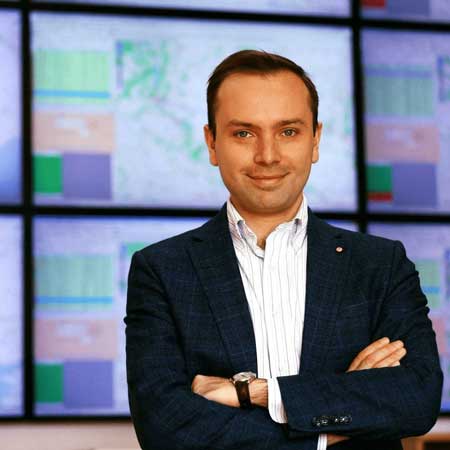 |
|---|
| Oleksandr Pertsovskyi, CEO of the Ukrainian Railways Passenger Company |
Oleksandr, you studied economics at the Taras Shevchenko National University of Kyiv. How did your career develop later on?
I quickly realized that the Ukrainian education won’t be enough for me. So after my 4th year at the University, I followed the Fulbright program and went to the Brandeis International Business School in the USA. I was interested in international economics, international finance, and I wanted to gain experience in a global environment.
I was interested in international economics, international finance, and I wanted to gain experience in a global environment.
My business school was located in Boston, but it was a relatively new and small school, so prominent companies didn’t pay much attention to it. That fact didn't stop me. I took part in a career fair at a nearby MIT University, where I met the DHL team. It was winter time in Boston, snowy and cold. And the American headquarters of DHL was located in a sunny Miami (Florida).
I flew several times for an interview in Miami, and it was a stark contrast to Boston. Older people often go to Florida for a well-deserved retirement. There is a shining sun, the ocean, the yachts. And here I go, getting a chance to settle on the ocean coast even before retirement! ;) I’m kidding. In fact, my choice was influenced primarily by DHL's global ambitions as the world's biggest logistics company.
DHL operates in North Korea and in a total of 220 countries and territories. Then, I remember, the CEO of DHL jokingly said that all that was left was to "add Turkmenistan" to the map. And yet they achieved it! Deutsche Post DHL Group is the world's largest logistics company, employing 550,000 people – twice as many as we have in the “Ukrainian Railways”.
Deutsche Post DHL Group is the world's largest logistics company, employing 550,000 people – twice as many as we have in the “Ukrainian Railways”.
What was Your area of responsibility at DHL?
I started with projects in the USA, Canada, Germany, and then things became more interesting. In Singapore, a new regional headquarters was being actively developed, responsible for business in Asia and the Pacific, and I wanted to continue working there. My executives at DHL were surprised: “Do you speak Chinese? What do you have to do with Asia and Singapore? ”
I did not speak Chinese, but I liked the new markets, which were developing dynamically. Malaysia, Indonesia, Vietnam, Thailand were the growing markets near Singapore. So for the first time in my life I traveled to Singapore, and ended up staying there for almost 6 years, working on DHL projects throughout Asia – from China and Japan to India and Sri Lanka.
 |
|---|
Could you, please, describe some exciting projects You were working on at DHL?
I managed a 6-month project in Japan. We worked with the team at the car plant. We needed to rebuild all the logistics and supply chain operations. The Japanese car industry is already the "cradle" of the principles of efficiency and lean management. It is Japan, where Toyota management and their “Kaizen” philosophy were born. And we at DHL needed to make the system even more efficient. It was an exciting challenge.
In Indonesia, for example, in the "logistics business" in general, you can easily find a fisherman who pulls boxes of Coca-Cola between the islands, and keeps the volume of orders in memory
There were other markets: Indonesia, Vietnam, Thailand, Malaysia. We think that the Ukrainian economy is not very well developed in terms of logistics and management rules. But in fact, we can also give a head start to let’s say Malaysia. In Indonesia, for example, in the "logistics business" in general, you can easily find a fisherman who pulls boxes of Coca-Cola between the islands, and keeps the volume of orders in memory. So we had to learn to make forecasts and build supply chains in such markets with low data quality and questionable reliability of infrastructure.
At DHL in Asia, I was responsible for restructuring logistics chains for global and regional companies, and also starting new lines of business (for example, divisions that focused on e-commerce logistics). But then 2014 happened. In the morning, just in Kuala Lumpur, I was at the hotel and received a newspaper with the news on the front page about the shot down Boeing 777 of Malaysia Airlines in Ukraine. It was a revelation moment. And it became clear how close everything was.
 |
|---|
Have you decided to return to Ukraine?
I realized that I could not sit far away. Crucial things started happening in Ukraine, and I began looking for options to come back and do something useful for the country. At DHL we had a “sabbatical” practice – the opportunity to take a long vacation, for 3 or even 6 months. My first thought was to come to Ukraine for a short period of time, work on something for a few months and go back to a global career.
I remember the evening, when I sent a personal message on Facebook to the then Deputy Minister of Infrastructure Volodymyr Omelyan. Suddenly a night call came in from Omelyan, and he said: “Come. There is an interesting opportunity to "save" Ukrainian Post." I said: "Wait, where to come?"
Suddenly a night call came in from Omelyan, and he said: “Come. There is an interesting opportunity to "save" Ukrainian Post." I said: "Wait, where to come?"
Ukraine was about to begin the era of reforms of the state-owned enterprises. There was a contest for the position of the CEO of “Ukrainian Post”. I participated in the competition together with Igor Smilyansky, who eventually became a CEO, and me – his first Deputy. From 2016 to 2020 we worked as a strong team reforming this state monster known as “Ukrainian Post”.
From 2016 to 2020 we worked as a strong team reforming this state monster known as “Ukrainian Post
Then a new challenge appeared in my career – “Ukrainian Railways”. Sometimes I joke that in “Ukrainian Post” I was responsible for all the lost parcels in this country. Now I am responsible for all the linen that was not ironed properly in the trains :) Definitely, I’m not looking for a quiet life.
Do you remember your first 100 days of work at “Ukrainian Post”?
Both clients and partners of “Ukrainian Post” welcomed the beginning of the reforms. At that time, the market of logistics for e-commerce companies in Ukraine was almost monopolized. And here was a chance to create a competition. It was inspiring to me that not everyone had yet given up on this state-owned company. We were determined to live up to the trust.
What challenges did you face in Ukrposhta?
Challenge №1, probably, as in any state company, is team building. When Igor Smilyansky and I started working, “Ukrainian Post” was not even corporatized yet. Rather, “Ukrainian Post” was like a ministry where people go to work from 8 to 17 without a clear focus on results.
In many “Ukrposhta” branches, the break was sacred, and the fewer customers – the better. There was no understanding that you work for the people. No customers - no profit. No profit - no salary. You will be fired. A large number of employees lacked an understanding of these market principles.
Unfortunately, in many state-owned companies, people feel that they should be thanked and paid simply for the fact that they exist and come to work.
The challenge was to bring a critical mass of people with new thinking into the “Ukrainian Post”. I will say that bringing new people to “Ukrainian Post” was easier than to “Ukrainian Railways”. We had other companies in the market, from where we could invite people, who understood the specifics of the postal business.
The second challenge was lack of money. Or, as Yulia Volodymyrivna said, “zubozhinnya” (impoverishment). “Ukrainian Post” was severely underfunded. For example, the average age of cars in the fleet was over 15 years. When I first arrived at our central depot, there was a moment of weakness: I thought everything must be hopeless.
All the cars were unrealistically rusty. They were driving in “survival mode”. Some cars ran 1-2 million kilometers. For this, drivers were once awarded with the "Hero of Socialist Labor" badge.
And now look at the “Ukrainian Post” cars running on the streets of your cities: you will see modern Mercedes, Scania, Iveco, Citroën Berlingo. This is heaven and earth. So it turned out that even the most hopeless situations can be resolved.
The third challenge was the absence of technologies. We had a lot of business processes running purely “on paper”. Specialists, whom I met at the beginning, heard the word “API” from us for the first time.
Specialists, whom I met at the beginning, heard the word “API” from us for the first time.
They asked: “Why do You need it?” I said: “We need to integrate with our partners”. “We already have everything integrated, – a reply was, – a man with a flash drive comes, inserts the stick and sends us a file. What’s the problem? Why would You need an API?”
Indeed, why would “Ukrainian Post” need APIs?
We met with the biggest players on the e-commerce market: Vladyslav Chechotkin (Rozetka.ua), Andriy Logvin (Kasta.ua) and others. I said: “Why don’t You work with the “Ukrainian Post”? Give us 3, 4, 5 top-priority tasks, so that You could start working with us. “Ukrainian Post” needed a successful benchmark case to persuade the rest of the potential clients.
The speed of delivery of packages was important for clients, but one of the key issues was also the ability to integrate with “Ukrposhta” IT systems. And clients needed APIs, not flash drives.
Now I have similar issues in “Ukrainian Railways”. For example, there are some travel agencies who want to become partners. I start looking into the business process and realize that it involves fax, paper, teletypes (!) Don’t be surprised. We spend more than 6 million UAH per year on some telegrams related to the passenger trains! Again this is the issue of the technology gap we have in “Ukrainian Railways”.
What other challenges appeared to be similar between “Ukrainian Post” and “Ukrainian Railways”?
People. The same story, only in “Ukrainian Railways” it is even more complicated, because employees need to have special technical knowledge. And people who have such knowledge – they already work in “Ukrainian Railways”. There is no “external market” to recruit the specialists from. Sometimes we invite professionals from the regions to come and join our central management team. Sometimes we make the management rotations between different railway directions.
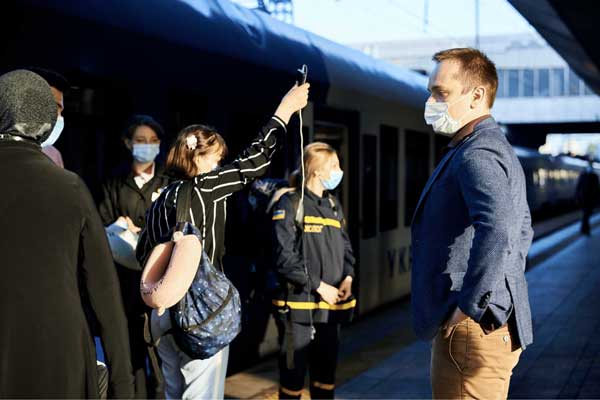 |
|---|
Could You hire foreign specialists to come to work at “Ukrainian Railways”?
The company already had such an experience. It is difficult for foreigners to work in Ukraine. There is a language barrier, cultural differences, mentality gap. It is unlikely that a specialist from Deutsche Bahn will understand how the locomotive could be stopped in the field and employees will drain the diesel. And we uncovered the well-established schemes here: people know where there are sections of stations without video surveillance, where there is little lighting. They stop the locomotive right there, and drain the fuel.
It is unlikely that a specialist from Deutsche Bahn will understand how the locomotive could be stopped in the field and employees will drain the diesel.
Another challenge is the lack of the sense of the market. One way or another, “Ukrainian Railways” is the only company in Ukraine that operates railways. Many employees do not have the feeling that they need to fight for the passenger. There is no feeling that we need to compete with the airlines, buses, BlaBlaCar, and personal cars.
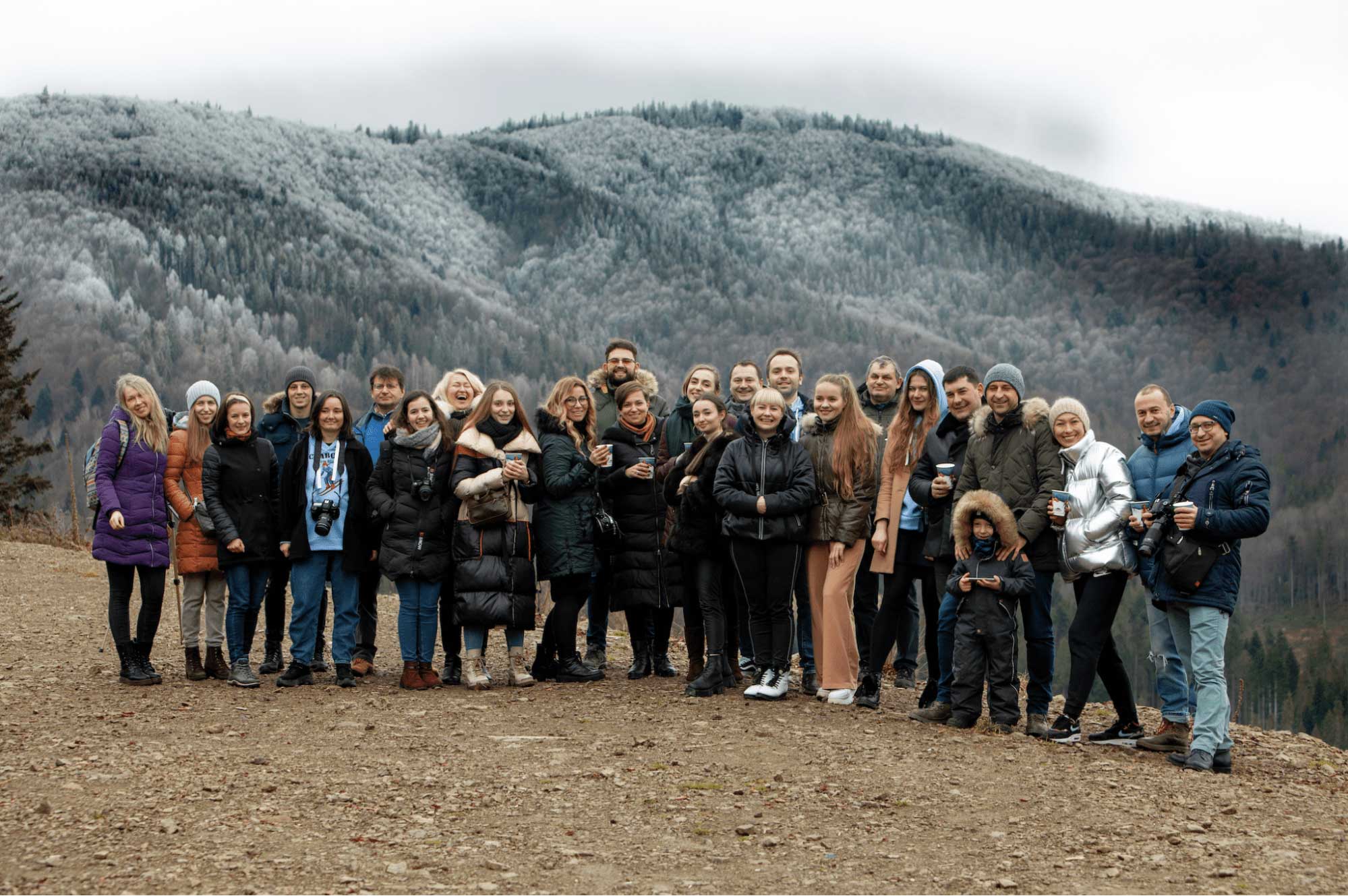 |
|---|
| “Ukrainian Railways” team during Ski express tour |
But then a pandemic began. And there was some luck in this misfortune. The passengers suddenly disappeared alongside with their money, and railway employees realized that they needed to fight to get the passengers back.
Another challenge is the very long cycle of decision-making in the transport sector. Repair and construction of the new carriages is a matter of years. Recently I visited the depot, where I discovered two Škoda trains. I thought: “Ok, we will prepare the business case, repair the trains, and put them to work quickly”. But even under all the positive circumstances, the repair cycle is at least 1 year. Building the infrastructure also takes years. You need to conduct geo-exploration, resolve land issues, set up power lines etc.
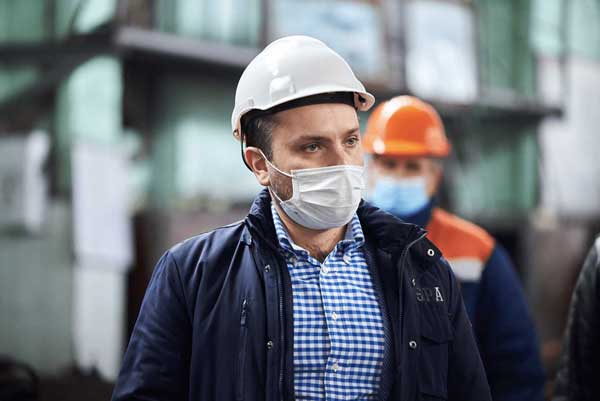 |
|---|
I have a choleric temperament, and I want everything done quickly. Fortunately, there are things that can and should be done faster: for example, improving customer service through digital technologies.
You started working at “Ukrainian Railways” in October 2020. What projects were implemented quickly?
In partnership with Visa and based on Corezoid Process Engine technology by Middleware we launched the sale of the railway tickets in chatbots in Viber and Telegram messengers in just 2 months
In partnership with Visa and based on Corezoid Process Engine technology by Middleware we launched the sale of the railway tickets in chatbots in Viber and Telegram messengers in just 2 months. We took a close look at the customer journey and tried to understand, what things could be improved quickly? The client journey begins with a purchase of a ticket, then you travel to the station, board the train, get services during the trip, get out of the train and finish your journey. Ideally, the whole trip ends with a service quality survey. In this customer journey, the very first stage, buying a ticket, could be significantly improved.
It so happened that for a long time “Ukrainian Railways” did not have (and still does not have) its own mobile application for ticket sales. And the development of such an application is a rather long process.
We decided that chatbot could be created faster, and buying tickets via messengers and getting background information is a good service, especially for a young audience. Technically, in the messenger we can not only sell a ticket, but also offer additional services, show the train schedule, collect feedback from passengers.
We decided that chatbot could be created faster, and buying tickets via messengers and getting background information is a good service, especially for a young audience
One of the problems of “Ukrainian Railways” is that the salary of managers and stewards is not tied to the quality of customer service. A chatbot is a good opportunity to build a system for evaluating employees and introduce a variable bonus part, which will depend on the feedback from the passengers. The more polite stewards will get more money.
Also in the chatbot we started to show from which track the train leaves.
Also in the chatbot we started to show from which track the train leaves. It turned out that “Ukrainian Railways” has a different system in place at each station, which is responsible for informing passengers on which track the train is coming. But we were able to integrate at least the IT systems of major cities and start showing the online tableau of Kyiv-Pasazhyrsky central station. Unfortunately it turned out that QR code in the ticket that people buy in the chatbot can’t be scanned by obsolete devices that conductors have. This was a signal that it’s time to change these outdated terminals to mobile apps for conductors. And we already started such a project, at least for Intercity+ trains.
Who are the key partners of “Ukrainian Railways” in the digital transformation projects?
In the project with the launch of the chatbot in 2 months, we thank Visa, which funded the development and marketing. Technology partner of “Ukrainian Railways” in this project Middleware Inc. company already had experience of working with messengers. Middleware did not start developing a chatbot from scratch, but used their own Corezoid-based bot-platform to integrate with messengers, payment gateways and IT infrastructure of “Ukrainian Railways”.
Middleware did not start developing a chatbot from scratch, but used their own Corezoid-based bot-platform to integrate with messengers, payment gateways and IT infrastructure of “Ukrainian Railways”.
I am very supportive of all sorts of partnerships. For Visa, working with “Ukrainian Railways” is an opportunity to organize a new flow of non-cash payments. The business of “Ukrainian Railways” still often involves cash. For example, we have a problem with “unofficial” cash payments at the entrance to suburban trains. Also, up to 30% of purchases for long-distance trains and 100% for suburban trains still occur through cash registers and cashiers. We would like to sell most tickets and services online, cashless, through mobile devices and using payment cards.
 |
|---|
| “Ukrainian Railways” chatbot |
In a relatively short time, 100,000 users joined the chatbot.
For our technology partner Middleware company, this project was an opportunity to create and quickly scale the solution based on their Corezoid Process Engine technology. In a relatively short time, 100,000 users joined the chatbot. Every year, “Ukrainian Railways” transports 40 million long-distance passengers and more than 100 million in suburban trains (this is indicative pre-pandemic statistics, but I'm sure we will return to these numbers). The most popular messenger in Ukraine, Viber was installed by 22 million people. We have almost limitless opportunities for the development of digital services.
We have almost limitless opportunities for the development of digital services.
How did you assemble Your team to work with You in “Ukrainian Railways”?
There are 2 elements in any selection of the new employees: competence and desire to work. From this point of view, it is easier for private companies to recruit people: they can find motivated people and pay a lot for their competencies. But in state-owned companies over the years, I have adjusted my focus to the maximum search for people with passion, curiosity, and a high level of self-motivation. One must love challenges. Otherwise, after 1-2 months of routine and breaking the walls people ask a question: "What am I doing here?" – and leave the company.
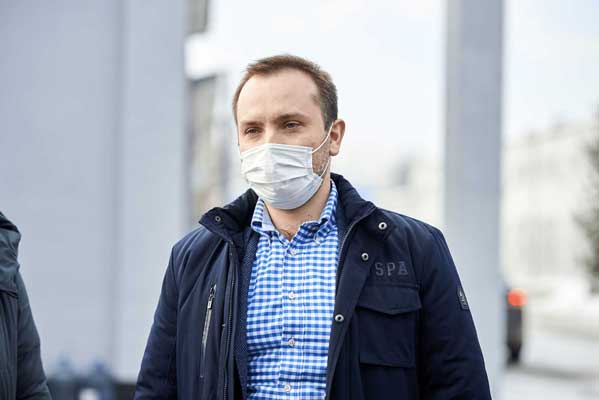 |
|---|
Can you please give examples of such energetic people in the team?
There are different stories of how people get into the “Ukrainian Railways” team. We have strong professionals, who were already working in the “Ukrainian Railways”, when I joined the company.
For example, Andriy Malakhov, project manager at the Project office, who was responsible for the launch of the chatbot to sell railway tickets. Andriy has witnessed 3 CEOs come and go. Some listened to Andriy, others did not, but TOP-managers were changing faster than Andriy could actually launch anything.
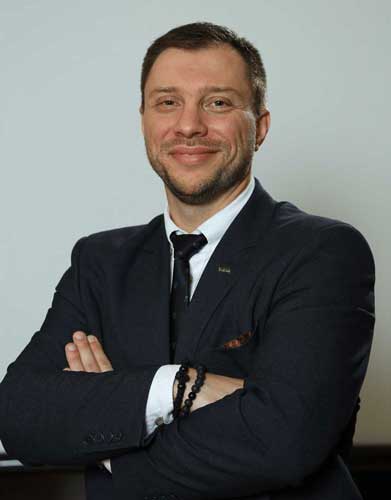 |
|---|
| Andriy Malakhov, Project manager of the “Ukrainian Railways” |
When we met Andriy, I was glad that “Ukrainian Railways” has people inside with experience, bright mind and a passion to create successful projects. Therefore, I granted Andriy a full mandate of confidence and a green light to launch the project.
Oleksandr Shevchenko, Head of Communications, Marketing and Customer Service, came to “Ukrainian Railways” from the private sector, having previously worked for “Biosphere Corporation”, Unicredit Bank, Ukrsibbank BNP Paribas Group. Oleksandr was fascinated by the scale of “Ukrainian Railways” projects, as well as the opportunity to form his own team, which will change the style of communications with passengers forever.
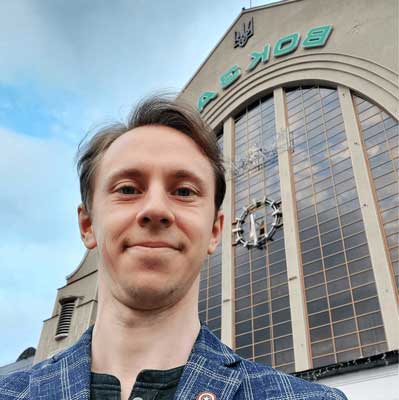 |
|---|
| Oleksandr Shevchenko, Head of Communications at “Ukrainian Railways” |
I invited some people to work from “Ukrainian Post”, as it is also a state-owned company and has a similar corporate culture. On the other hand, I don’t want to create a separate enclave of ex-Ukrposhta employees in “Ukrainian Railways”.
Also there are people in “Ukrainian Railways”, who were promoted from within the company. For example, my deputy Volodymyr Lyubka used to work as the manager of a locomotive depot on “Prydniprovska Railways”, and now he has joined the management team of the entire passenger direction in HQ. Volodymyr is an enthusiastic person, well versed in all the technical nuances of the railways.
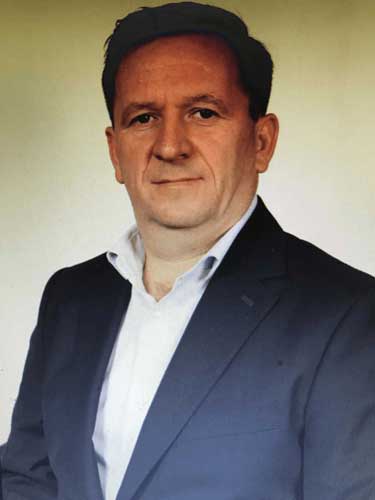 |
|---|
| Volodymyr Lyubka, Deputy CEO of the Ukrainian Railways Passenger Company |
I like that now we have such a mix of young blood and those bright, professional, energetic people who have previously worked at “Ukrainian Railways”.
How can you get a job at “Ukrainian Railways”?
It is simple. We have a Facebook page. Send us a message and we can talk. To be honest, there are many messages from people, who say they want to work at “Ukrainian Railways”. However, as I mentioned, it is important to understand what motivates a person. I remember a case, when a man wrote: “I want to work at “Ukrainian Railways” in Kyiv”. I replied: “What would You like to do?” He said: “I don’t care. Just give me any job and I want to have a good salary of XXX UAH”. It is not bad that a person wants a high salary. The problem is that he’s not passionate about anything.
It is not bad that a person wants a high salary. The problem is that he’s not passionate about anything.
Also I often rotate the managers between regions or departments. Recently I’ve rotated 5 heads of regional depots and gave everyone the opportunity to prove himself in a new role. It is always interesting to see what a person will do in a new place. Having an unbiased look makes it easier to notice things that might be improved and perhaps, employees that need to be replaced.
There are many castes within “Ukrainian Railways”: locomotive drivers, carriage personnel, traffic managers. And people do not move much between castes, although the competencies are sometimes similar. Recently, for example, we have started to involve people from locomotive depots to work with the carriages department, which is also a fresh boost in professional development.
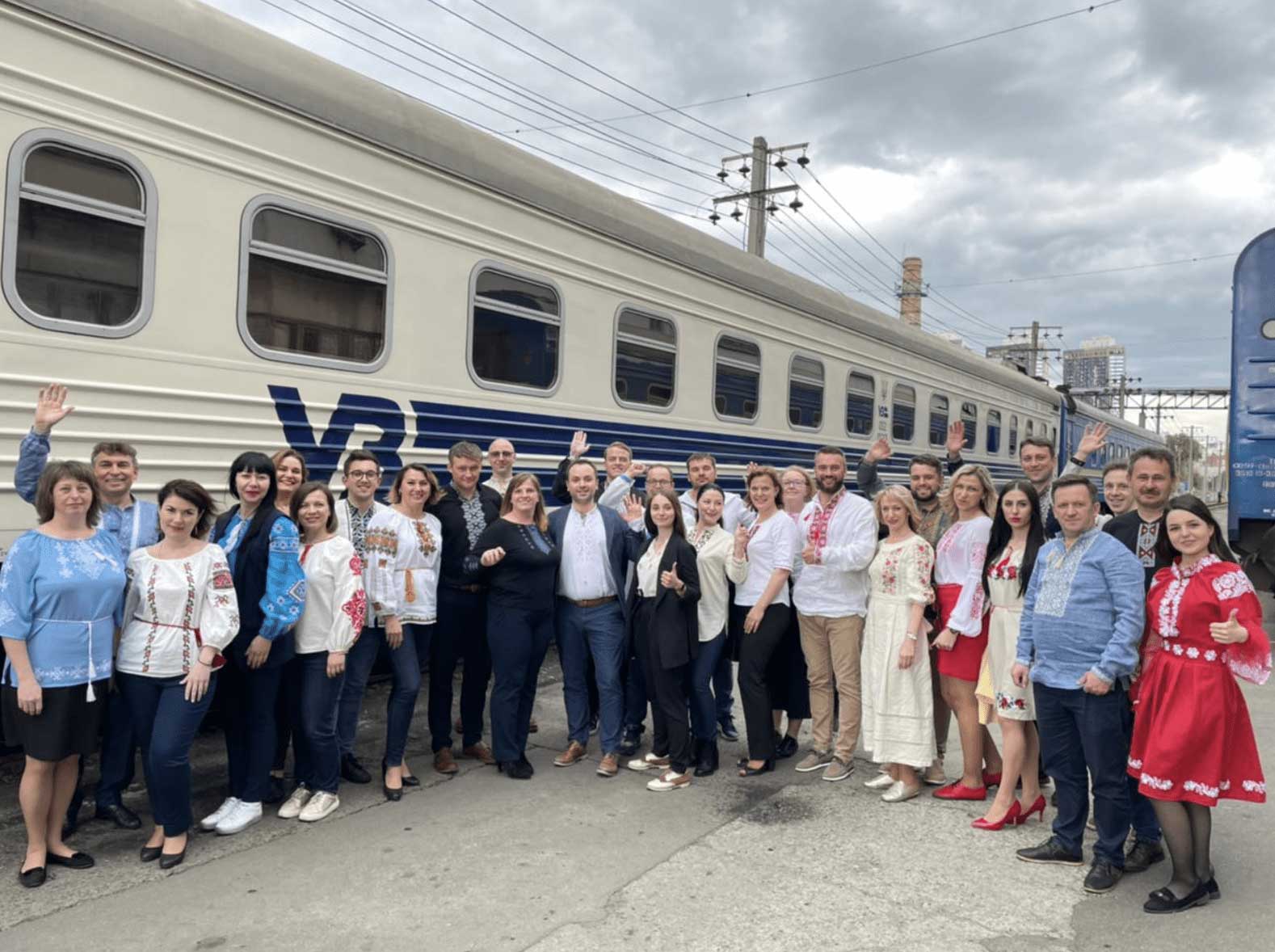 |
|---|
| Vyshyvanka day in “Ukrainian Railways” |
Is there a separate caste of IT specialists?
In terms of the number of people involved in IT, I think both “Ukrainian Post” and “Ukrainian Railways” are far ahead of many IT companies in Ukraine. “Ukrainian Post” had 600 people who are connected to IT profession in one way or another. In “Ukrainian Railways” it is even difficult to say exactly how much people in IT we have, but I think the figure is measured in thousands. The problem is that many IT professionals are "hidden."
In “Ukrainian Railways” it is even difficult to say exactly how much people in IT we have, but I think the figure is measured in thousands.
At some stage, “Ukrainian Railways” company was centralized, including IT-staff. But no one believes in things like the single “Help desk”. Therefore, an employee can be listed as a "Deputy Head of the Depot" somewhere in Kakhovka, and in fact he is a system administrator. In terms of scale and number of people in IT, yes, “Ukrainian Railways” is an IT company. There are many IT-products that were developed and now are maintained by the “Ukrainian Railways”. Whether those products are modern and convenient – this is another question. But yet they exist.
Therefore, an employee can be listed as a "Deputy Head of the Depot" somewhere in Kakhovka, and in fact he is a system administrator.
What is “Ukrainian Railways” IT strategy? Do you want to develop IT competencies in-house? Or do You plan to announce RFPs and buy software from the market?
This is a really difficult issue for a state-owned company. I do not mind buying IT services from the market. But in Ukraine, the procedure for purchasing IT services for the public sector is complicated. When you buy coal, everything is simple. This is a commodity. There is a product with clear parameters. You can buy the product, and if the quality does not suit you – change the supplier. Pricing is clear. But IT and creative services are a completely different story.
We used to buy creative services for TV advertising at “Ukrainian Post”. And then people came from the Security Service of Ukraine (SBU) and asked: "Why did you buy the creative strategy for UAH 3 million, when the students of Karpenko-Kary University could shoot the video with their own camera for UAH 100,000?" How would you explain that the creative content we needed couldn’t cost UAH 100,000?
The situation is similar with IT products. You can describe the technical requirements, and then some no-name company comes, promises the lowest price, works for 3-6 months, and then says: “Oh! It didn't work out." The IT solution seems to work, but not quite as expected. You begin court trials, but the time is lost.
The second problem is ownership rights. Unfortunately, state-owned companies in Ukraine are followed by a flock of private companies who have settled down so well that they have made state-owned companies hostages, in fact. Sometimes such private companies even get a percentage from each transaction inside “Ukrainian Railways”, and it is very difficult to get rid of such suppliers. I believe that “Ukrainian Railways” should cooperate with private companies, but not become totally dependent on them.
And the third factor to consider is working with people's personal data. There is a state vision that large strategic enterprises should work with personal data using their own data centers, not on the servers of third-party solution providers.
How to motivate IT specialists to work in “Ukrainian Railways”?
Challenging tasks and interesting partnerships motivate well.
In my experience, IT professionals in the public sector like the scale of the challenges. IT professionals are highly motivated to see the results of their work for the whole country. Plus, it's a good opportunity to start a career, grow, collaborate with global companies such as Visa, Viber, Amazon, Google, Apple, with leading Ukrainian companies. Challenging tasks and interesting partnerships motivate well.
Could You recommend several books, TV-series, movies to readers?
Number one book for all railway workers is the "The rules of the technical operation of the railways".
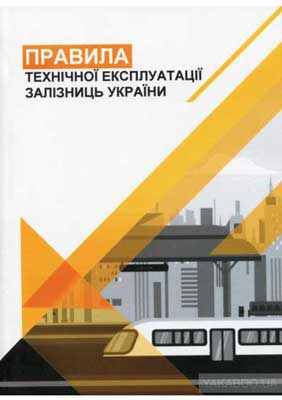 |
|---|
There is a technical library of “Ukrainian Railways” on my floor. I came there on the first day of work, and the employees did not recognize me. I asked to read some basic books. The librarian told me: "Okay, give me your railways worker ID." And I did not have such an ID.
It turned out that there is such a special blue document, which is called “railways worker ID”. Eventually I picked up books in the library on traffic management, technical issues. Railways is another reality, it captures the imagination, there is the whole world to learn and understand. It’s exciting to study that much new stuff in adulthood.
Also, I can recommend the book "Trillion dollar coach", which I listened to as an audiobook.
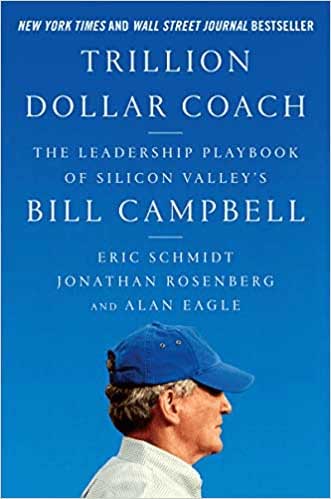 |
|---|
| “Trillion Dollar Coach”, Bill Campbell |
In Singapore, I read and listened to Lee Kuan Yew's audiobooks, such as “The Singapore Story: Memoirs of Lee Kuan Yew”.
I was at Lee Kuan Yew's funeral in Singapore. It is amazing what a man managed to do in one generation. And all this is true. You travel to neighboring Malaysia and realize how different it is from Singapore.
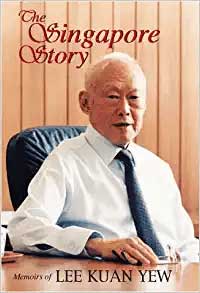 |
|---|
| “The Singapore Story: Memoirs of Lee Kuan Yew” |
Talking about TV-series, I recommend "Snowpiercer", which describes the post-apocalyptic world, where the last survivors on Earth travel in a self-sustaining train.
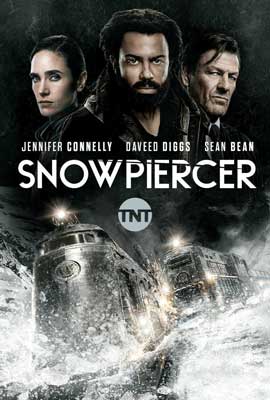 |
|---|
| “Snowpiercer” |
Also I like "The Last Dance" – a Netflix documentary sports drama about Michael Jordan. It has many parallels with the business world, especially on the team relations, the role of a leader in teamwork.
From my previous life in “Ukrainian Post” I can recommend "Going postal".
This is a film about a man who was sentenced to death, but then it turned out that there is an even worse punishment – go to reform the post office. An interesting film about the challenges, the fight against bureaucracy. It is very real
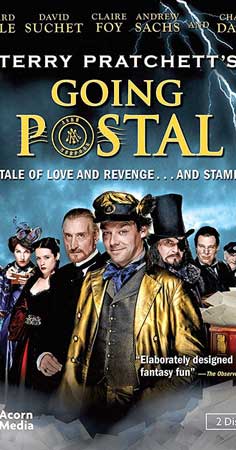 |
|---|
| “Going postal” |
Do you have a hobby?
For a while during the sabbatical at DHL, I lived in Switzerland and received a pilot's license to operate a paraglider. There are clubs in the Carpathians and near Kyiv where they also do this sport. I remembered a phrase from one of my mentors: “Why be afraid of heights? Man crashes not on the air, but on the ground. The higher the better. If you fall from 100 meters, you will still be killed. And at an altitude of 2 km there is a chance to orient and correct the situation if something goes wrong."
Paragliding teaches you to think strategically. You fly up navigating the warm air and due to changes in temperature. Watch out for places with no wind.
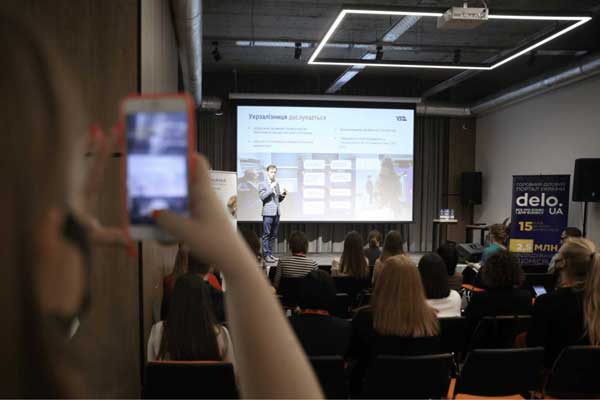 |
|---|
What are the main directions of “Ukrainian Railways” development now? How do You see the company in 5-10 years?
Quite a lot of time has passed since April 1, so I will not say that the main priority remains the construction of Hyperloop :) And seriously, I would very much like to radically update the quality of carriages. No matter what additional services you offer, yet the safety and quality of the trip are determined primarily by the quality of trains. It's like in “Ukrainian Post”: a lot could be planned and done, but the focus at the start was on making sure that the cars drive safely and on time. When the cars break and stop – everything else becomes non-essential.
In “Ukrainian Railways” the basis of our service is a reliable and safe delivery of a person from point A to point B. And for this “Ukrainian Railways” needs to have good trains and carriages.
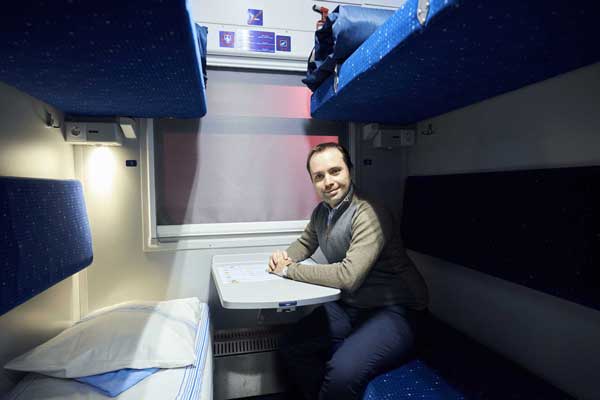
What is being done in this direction?
We are running large overhaul programs, receive the state funding for the purchase of 100 new carriages, and procurement procedures are underway.
As for financing, I think that, as in any business, there must be an honest and transparent situation. For example, the state identifies and finances certain 20 socially significant routes. Then there is the opportunity to make plans: how many people will be able to travel, on what terms, on what schedule. Unfortunately, this is the case when not everything depends on the leaders of “Ukrainian Railways”. It is necessary to make changes in regulations.
On the other hand, working in a state-owned company trains you to work in conditions where 20% depend on you and 80% on external circumstances. But in reality you have to forget that there are some "external" circumstances. You can't just say, "I can't do this because of imperfect laws." So, you need to go to the Parliament deputies, find arguments. If they are not immediately convinced, find other ways of influence, break through these walls. Therefore, the second direction of reforms is to change the financing model of “Ukrainian Railways”.
And the third direction of reforms is communication with the personnel within the company. I want people to be satisfied with their work, to have a normal system of motivation that they can influence. You provide the best service – you get more income. If it is repair personnel – you repair well, so that after you there are no tons of complaints – you receive more money.

